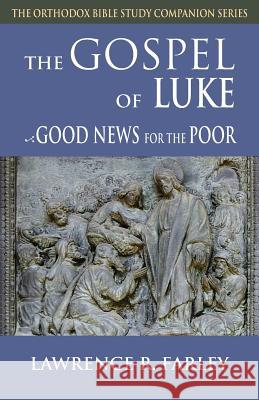Gospel of Luke: Good News for the Poor » książka
Gospel of Luke: Good News for the Poor
ISBN-13: 9781936270125 / Angielski / Miękka / 2010 / 440 str.
Gospel of Luke: Good News for the Poor
ISBN-13: 9781936270125 / Angielski / Miękka / 2010 / 440 str.
(netto: 90,57 VAT: 5%)
Najniższa cena z 30 dni: 93,52
ok. 16-18 dni roboczych.
Darmowa dostawa!
Subtitle: Good News for the PoorThe Gospel of St. Luke has been described as "the loveliest book in the world." It was written by a Gentile for Gentiles, with the purpose of touching their hearts with the Good News of Christ. Luke speaks especially to the poor and the marginalized of society-including women-with an emphasis on joy, healing, and prayer. With his gift for making the fruits of biblical scholarship accessible to the ordinary layperson, Fr. Lawrence Farley expounds this beautiful account of the life and ministry of Christ for contemporary Christians. About the Orthodox Bible Study Companion Series: This commentary was written for your grandmother and for your plumber. That is, it was written for the average layperson, for the nonprofessional who feels a bit intimidated by the presence of copious footnotes, long bibliographies, and all those other things which so enrich the lives of academics. Working from a literal translation of the original Greek, this commentary examines the text section by section, explaining its meaning in everyday language. Written from an Orthodox and patristic perspective, it maintains a balance between the devotional and the exegetical, feeding both the heart and the mind.
Subtitle: Good News for the PoorThe Gospel of St. Luke has been described as "the loveliest book in the world." It was written by a Gentile for Gentiles, with the purpose of touching their hearts with the Good News of Christ. Luke speaks especially to the poor and the marginalized of society-including women-with an emphasis on joy, healing, and prayer. With his gift for making the fruits of biblical scholarship accessible to the ordinary layperson, Fr. Lawrence Farley expounds this beautiful account of the life and ministry of Christ for contemporary Christians.About the Orthodox Bible Study Companion Series:This commentary was written for your grandmother and for your plumber. That is, it was written for the average layperson, for the nonprofessional who feels a bit intimidated by the presence of copious footnotes, long bibliographies, and all those other things which so enrich the lives of academics. Working from a literal translation of the original Greek, this commentary examines the text section by section, explaining its meaning in everyday language. Written from an Orthodox and patristic perspective, it maintains a balance between the devotional and the exegetical, feeding both the heart and the mind.











